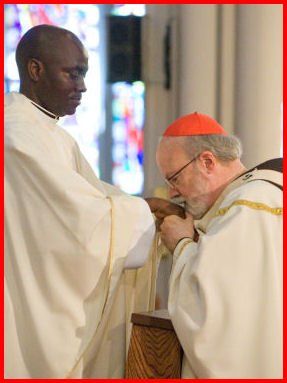Here are the short definitions of what is meant by each of these terms:
-Diocesan Priest: A diocesan priest is not a member of a religious order and is ordained to serve in a particular geographical area called a diocese and takes the vow of celibacy and the vow of obedience to the diocesan bishop and his successor. He ministers in parishes within the diocese or archdiocese.
-Deacon: The deacon is a man of faith called by the church to serve God and God's people as an official representative of the Church. He assists the bishop and priest in performing sacraments, proclamation of the Gospel and by dedicating himself to the charity of others. Whether married or single, the majority of deacons support themselves through a separate profession or occupation. Ordinarily, deacons offer their ministry freely to the Church.
-Brother: A brother is a layman who publicly consecreates himself to God and ministry within the Church through vows of poverty, celibacy and obedience. He lives in community for mutual support and companionship and focuses on prayer and ministry. A brother is not ordained to the priesthood.
-Friar: The word "friar" comes from the Latin word "frater", meaning "brother". When St. Francis founded a religious community, he intended its members to live as brothers without distinction of rank, title, or education.
An example of friars are the Capuchins, who are are a religious community of both lay brothers and ordained priests. Yet, in the spirit of St. Francis, friars - lay and ordained - see themselves as brothers, as equals, with no one greater or less than the next, respectful to one another and to all of creation.
-Monk: A monk may be conveniently defined as a member of a community of men, leading a more or less contemplative life apart from the world, under the vows of poverty, chastity, and obedience, according to a rule characteristic of the particular order to which he belongs. The word monk is not itself a term commonly used in the official language of the Church. It is a popular rather than a scientific designation, but it is at the same time very ancient, so much so that its origin cannot be precisely determined.
A monk is a man living in a religious community and makes a final profession of the solemn vows of poverty, chastity, and obedience. A monk may be a priest or a deacon, who has received the Sacrament of Holy Orders, or a religious brother, who is not ordained. Monks live in a monastery, the word from which "monk" is derived. Depending upon the circumstances of the particular order, they may have a very strict contemplative, cloistered lifestyle, like the Order of Cistercians of Strict Observance (commonly known as the Trappists), or a less strictly cloistered lifestyle, like the Benedictines.

